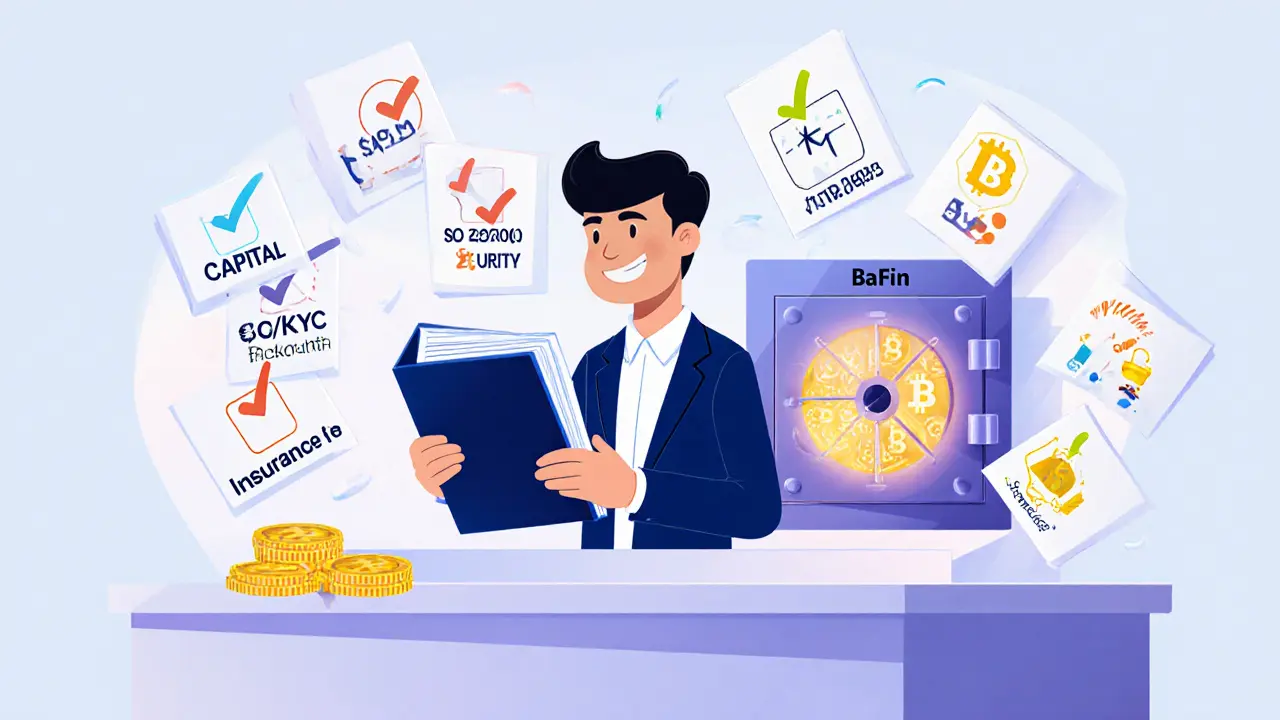BaFin Crypto Compliance Checker
Check Your Crypto Activity
Select the type of crypto activity you're planning to perform in Germany to see if a BaFin licence is required.
Compliance Result
Key Compliance Points
- All crypto asset services require a BaFin licence unless exempted
- The 'travel rule' applies to all crypto transfers above €10,000
- AML/KYC policies must be implemented and maintained
- Minimum capital requirements apply depending on service type
- IT security standards (e.g., ISO 27001) are mandatory
Key Takeaways
- BaFin is Germany's sole regulator for all crypto‑asset services; a licence is mandatory for custody, trading, stablecoins and many DeFi activities.
- The EU's MiCAR framework now sits on top of national laws such as the FinmadiG, KMAG and the KWG.
- AML/KYC obligations flow from the German Crypto Asset Transfer Regulation (KryptoWTransferV) and implement the FATF "travel rule".
- Licensing thresholds are strict - accepting crypto payments is fine, but using a payment‑provider without a BaFin licence can trigger enforcement.
- Recent cases (e.g., Ethena GmbH) show BaFin’s willingness to intervene quickly when rules are breached.
When a crypto‑service provider wants to operate in Germany, the first question is: BaFin cryptocurrency compliance isn’t optional - it’s the law. This guide walks you through the whole stack of rules, the licence application process, and the day‑to‑day controls you’ll need to keep BaFin happy.
Who is BaFin and Why Does It Matter?
BaFin is the Bundesanstalt für Finanzdienstleistungsaufsicht, Germany’s federal financial supervisor. It has the legal mandate to monitor banks, insurance companies, securities markets and, since 2013, crypto‑assets. By classifying Bitcoin as a "unit of account" early on, BaFin gave the country a clear legal footing that many other jurisdictions still lack.
European and National Legal Backbone
The regulatory picture rests on two layers:
- MiCAR - the EU Markets in Crypto‑Assets Regulation, which sets uniform rules for token issuance, white‑papers and provider conduct across all member states.
- German statutory acts that translate MiCAR into local practice:
- FinmadiG (Act on the Digitalisation of the Financial Market) - adds transitional provisions for existing crypto businesses.
- KMAG (Act on the Supervision of Markets for Crypto‑Assets) - creates a dedicated supervisory framework for crypto‑service providers.
- KWG (German Banking Act) - treats many crypto‑assets as financial instruments, triggering the licensing requirement.

When Do You Need a BaFin Licence?
BaFin distinguishes between pure “payment‑in‑kind” activities and regulated financial services. The rule of thumb is:
- Accepting crypto as payment for a one‑off sale - no licence.
- Providing a service that stores, trades, or exchanges crypto for third parties - licence required.
- Running a mining pool, proprietary trading platform, or offering tokenised securities - licence required.
Even if you only serve German residents from abroad, BaFin can claim jurisdiction if you target those customers actively (advertising, local language website, German‑language support).
Licensing Process: What BaFin Looks For
Getting the green light involves a formal application that covers:
- Corporate structure and capital adequacy (minimum €5million for most crypto‑service providers).
- Risk‑management framework, including IT security standards (ISO27001 is the de‑facto benchmark).
- AML/KYC policies that meet the requirements of the KryptoWTransferV (German Crypto Asset Transfer Regulation).
- Detailed white‑paper (if you intend to issue a new token) that complies with MiCAR’s disclosure checklist.
- Proof of professional indemnity insurance (minimum €2million for custody services).
Since the Wirecard scandal, BaFin tightened its scrutiny but also sped up decisions - some licences are now granted within three months if the dossier is complete.
AML/KYC and the Travel Rule
Under KryptoWTransferV, every crypto transfer must carry the same data as a traditional bank wire: originator name, beneficiary name, and wallet addresses. This is the German implementation of the FATF "travel rule". Failure to collect and forward this data can lead to fines of up to €500000 per breach.
Key compliance points:
- Integrate a real‑time transaction monitoring system that flags transfers above €10000 (or equivalent in crypto).
- Maintain a secure audit trail for at least five years.
- Conduct periodic AML training for all staff handling crypto transactions.
Recent Enforcement Actions and Regulatory Updates
BaFin’s enforcement pulse has quickened. Two high‑profile moves in 2025 highlight the trend:
- On 25June2025, BaFin ordered the winding up of Ethena GmbH’s USDe stablecoin activities. Token holders were given a two‑month redemption window, and BaFin appointed a special representative to oversee the process.
- On 6March2025, the Federal Ministry of Finance (BMF) released new tax circulars that rename “virtual currencies” to “crypto assets”, distinguish active from passive staking, and define the documentation needed for DeFi income.
These actions underline that BaFin expects both licensing compliance and robust reporting on the back end.

Practical Compliance Checklist
| Service | BaFin Licence Needed? | Key Legal Basis | Typical Capital Requirement |
|---|---|---|---|
| Crypto Custody | Yes | KWG §1(1a) + KMAG | €5million (cash) + €5million (crypto assets) |
| Exchange / Trading Platform | Yes | KWG §1(1a) + MiCAR | €5million |
| Stablecoin Issuer (tokenised monetary unit) | Yes | MiCAR Article5 + KMAG | €2million |
| DeFi Yield Farming Service | Case‑by‑case (usually yes) | KWG + MiCAR | Varies - generally €5million |
| Pure Payment Acceptance (one‑off sale) | No | None (unless payment‑provider used) | N/A |
Use the table above as a first filter. If you fall into a “yes” column, start the licence preparation early - missing documents are the biggest cause of delays.
Pitfalls to Avoid
- Relying on foreign payment processors without BaFin licences. Even if the processor is based elsewhere, BaFin can hold the German merchant accountable.
- Skipping the white‑paper review for a new token. MiCAR requires a detailed risk‑analysis, token economics, and legal classification before any public offering.
- Under‑estimating IT security audits. BaFin conducts periodic technical inspections; failure to meet the minimum security standards can lead to licence suspension.
- Mixing regulated and non‑regulated activities under the same legal entity without clear segregation - BaFin expects separate governance structures.
Next Steps for Your Business
1. Map every crypto‑related service you plan to offer against the checklist.
2. Draft a compliance manual that covers AML/KYC, data retention, and incident response.
3. Engage a legal counsel familiar with BaFin and MiCAR to prepare the licence dossier.
4. Run a pre‑audit of your IT environment - focus on wallet security, encryption, and access logging.
5. Submit the application via BaFin’s online portal and keep a trace of all communications.
Following these steps will reduce the risk of a surprise enforcement action and keep your operations on solid ground.
Frequently Asked Questions
Do I need a BaFin licence if I only store my own crypto?
No. Self‑custody of your own assets does not count as a crypto‑asset service. The licence requirement kicks in when you store crypto on behalf of third parties.
Can a non‑German company obtain a BaFin licence?
Yes, but the company must establish a legally dependent branch or a physical presence in Germany and demonstrate that it targets German residents.
What is the deadline for the “grandfathering” licences under FinmadiG?
Existing licences remain valid until 31December2025. After that date, providers must either obtain a MiCAR‑aligned licence or cease the regulated activity.
How does the travel rule work for crypto transfers in Germany?
Every crypto transaction above €10000 must include the originator’s name, address, and wallet ID, plus the beneficiary’s corresponding data. The information travels with the transaction to the next service provider, which must retain it for five years.
What are the penalties for non‑compliance?
BaFin can impose administrative fines up to €500000 per breach, order the suspension of services, or even pursue criminal prosecution for severe AML violations.


Don Price
When you look at the BaFin crypto compliance framework, you see more than just a set of regulations – you see a carefully crafted instrument of global financial control, designed by the same shadowy cabal that puppeteers the ECB, the FATF, and the unseen hand behind every central bank digital currency experiment. The language in the guide is deliberately convoluted, with references to MiCAR, KMAG, and KWG that only legal technocrats can decode, which is exactly the point: to keep the average entrepreneur in the dark while the regulatory elite tighten their grip. Notice how the travel rule is emphasized; it mirrors the same data‑harvesting push that the NSA championed in the early 2000s, now repackaged as anti‑money‑laundering. Every capital requirement – €5 million for custody, €2 million for stablecoins – is a barrier to entry that ensures only pre‑approved, well‑funded players can survive, effectively monopolizing the market for the benefit of incumbents and their political backers. The requirement for ISO 27001 certification is another veil, suggesting that compliance is about security, when in reality it creates a new revenue stream for consulting firms aligned with BaFin’s agenda. Moreover, the recent enforcement actions against Ethena GmbH are not isolated punishments; they serve as public warnings to any would‑be disruptor that dares to operate without explicit state approval. The fact that BaFin can claim jurisdiction over foreign entities merely because they target German residents is a direct attack on the principle of digital sovereignty, forcing every overseas platform to establish a German branch, which in turn subjects them to German tax and employment law – a classic trap of regulatory entanglement. The guide even mentions that “missing documents are the biggest cause of delays,” a thinly veiled threat that any slip‑up will result in months of bureaucratic limbo, draining resources and morale. All of this points to a coordinated strategy: to transform the nascent crypto ecosystem into a tightly regulated extension of the traditional banking system, where innovation is choked and profit is rerouted to the few who can afford the compliance machine. It is not about protecting investors; it is about preserving power, and the BaFin Crypto Compliance Checker is the user‑friendly façade for that agenda.
Mark Fewster
Reading through the guide, it's clear that BaFin has pooled a massive amount of detail into a single resource; the structure is logical, the tables are helpful, and the step‑by‑step checklist can really demystify the licensing process, especially for newcomers, however, the sheer volume of legal references can feel overwhelming at times, especially when you consider that each bullet point often leads to another regulation, such as MiCAR or KMAG, which demands further reading, nevertheless, the inclusion of real‑world examples like the Ethena case adds valuable context, making the abstract rules feel more concrete, and the emphasis on AML/KYC compliance aligns well with broader EU standards, which ultimately benefits the ecosystem by fostering trust, so despite the complexity, the guide serves as a solid foundation for anyone looking to navigate German crypto regulation.
Monafo Janssen
The guide does a good job of breaking down what services need a licence. It’s easy to follow, especially the table at the end. If you’re just selling crypto for a one‑off payment, you’re fine.
Jason Duke
Wow, this is a goldmine of info! 🚀 For anyone thinking about launching a crypto platform in Germany, this guide is a must‑read, because it not only tells you what you need, but also shows you the exact steps to get there, and the tone is encouraging while still being brutally honest about the hurdles, so roll up your sleeves and start checking those boxes!
Bryan Alexander
Imagine the thrill of finally getting that BaFin licence after weeks of paperwork – the moment you see the approval email feels like a scene straight out of a blockbuster, the drama of compliance finally turning into triumph, and now you can proudly announce to the world that your platform is officially sanctioned, a true testament to perseverance and vision!
Patrick Gullion
Sure, just ignore the whole thing.
Jack Stiles
hey guys, i think this guide is pretty solid, but if ur gonna launch a service, guesstimate your capital needs early, otherwise u’ll be stuck trying to scramble for funds later on.
Ritu Srivastava
It is absolutely reprehensible how many startups think they can bypass rigorous oversight and get away with treating customers' funds like pocket change; this guide makes it abundantly clear that such reckless behavior will be met with swift regulatory action, and anyone who chooses to ignore these mandates is complicit in potential fraud, which is an unforgivable moral failing in today's financial landscape.
Liam Wells
While the BaFin document is comprehensive, one might critique its excessive reliance on bureaucratic language, which could be perceived as an intentional obfuscation, thereby limiting accessibility for smaller entities; furthermore, the stipulation of ISO 27001 compliance, though beneficial, imposes a significant operational burden that may deter innovation, suggesting a policy bias favoring established institutions over emergent competitors.
Caleb Shepherd
Actually, the ISO 27001 requirement is a pragmatic safeguard: it forces firms to adopt industry‑standard security controls, which reduces the attack surface and protects users; if we ignored that, we'd open the door to massive data breaches, so the regulation is less about gate‑keeping and more about systemic risk mitigation.
Darren Belisle
Let’s keep the conversation constructive – while the regulations are strict, they also provide a clear roadmap for responsible growth, and by meeting these standards, German crypto firms can set a global benchmark for trust and stability, which ultimately benefits the entire ecosystem.
Lara Decker
You seem to think this guide is just a bureaucratic hurdle, but it actually serves as a protective shield for consumers; ignoring it wouldn't be a harmless shortcut, it would be a reckless gamble that could jeopardize countless users' assets.
Anna Engel
Isn't it charming how every regulatory document pretends to be the ultimate truth, yet everyone knows it's just a sophisticated way to tell you, "We decide what's cool, and you follow or else."
manika nathaemploy
hey, i get that the rules can feel heavy, but if you take it step by step, the whole process becomes manageable – think of it as building a puzzle, one piece at a time.